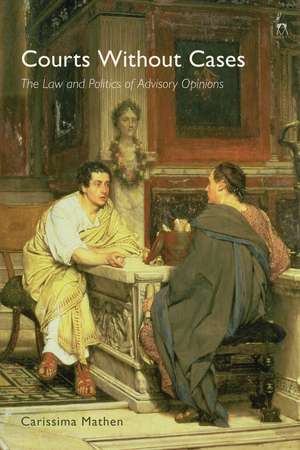Courts Without Cases: The Law and Politics of Advisory Opinions
Autor Dr Carissima Mathenen Limba Engleză Hardback – 17 apr 2019
| Toate formatele și edițiile | Preț | Express |
|---|---|---|
| Paperback (1) | 271.32 lei 6-8 săpt. | |
| Bloomsbury Publishing – 18 noi 2020 | 271.32 lei 6-8 săpt. | |
| Hardback (1) | 540.80 lei 3-5 săpt. | |
| Bloomsbury Publishing – 17 apr 2019 | 540.80 lei 3-5 săpt. |
Preț: 540.80 lei
Preț vechi: 774.26 lei
-30% Nou
Puncte Express: 811
Preț estimativ în valută:
103.48€ • 108.33$ • 85.62£
103.48€ • 108.33$ • 85.62£
Carte disponibilă
Livrare economică 15-29 martie
Preluare comenzi: 021 569.72.76
Specificații
ISBN-13: 9781509922499
ISBN-10: 1509922490
Pagini: 280
Dimensiuni: 156 x 234 x 23 mm
Greutate: 0.57 kg
Editura: Bloomsbury Publishing
Colecția Hart Publishing
Locul publicării:London, United Kingdom
ISBN-10: 1509922490
Pagini: 280
Dimensiuni: 156 x 234 x 23 mm
Greutate: 0.57 kg
Editura: Bloomsbury Publishing
Colecția Hart Publishing
Locul publicării:London, United Kingdom
Caracteristici
Examines an important but neglected feature of the Canadian constitution, which is the advisory function of the national courts, and compares this to similar functions in jurisdictions such as the EU.
Notă biografică
Carissima Mathen is Professor of Law at the University of Ottawa.
Cuprins
Introduction 1. Courts with Cases What Do Courts Do? The Power, and Limits, of Cases The Separation of Powers Separation of Powers in Canada 2. Apex Courts The Judicial Committee'A Judicial Department in Every Well-Organized Government' A. Confederation B. Establishment 3. Canadian References Framing the Function Early Quiet, Early Reform Squaring Advisory Opinions with a General Court of Appeal Putting the 'Advisory' in an Advisory Function 4. Separate Functions - Separate Powers Executive Requests and Judicial Resistance The Lonely Legislature? 5. Arbitrating Federalism Federalism Post-Confederation A. Treaties B. Disallowance C. Marriage Apex Change - The Revamped Court A. Natural Resources B. Infl ation and Emergency C. Inter-provincial Trade Current Battles A. Criminal Law B. Economic Regulation C. Environment and Development 6. Rebirth, and Rupture Supreme at Last Constitutional Rebirth A. The Path to ChangeB. Patriation C. Consequences: Quebec Veto 7. Interpretation and Rights Prologue: Process and Persons An Age of Rights A. Fundamental Justice and Criminal Fault (Motor Vehicle) B. The Rule of Law (Manitoba Language) C. Competing Constitutional Interests (Bill 30) D. Revisiting Past Decisions (Prostitution) E. The Intersection of Individual Rights, Federalism and Politics (Same-Sex Marriage) 8. Institutions Rupture, for Real: Quebec Secession Amendment, Actors and Judicial Supremacy A. Frozen in Time: Senate Reform B. Self-entrenchment 9. Actors, Advice and Law The Core Tension Why Pursue? A. Doctrinal Guidance B. Co-ordination C. Strategy D. Imprimatur Why Not Comply? Why Comply? 10. The Advisory Court Process Authority, Precedent, Stare Decisis Providing Answers A. Abstract Review B. Answers, Declarations, Remedies Conclusion
Recenzii
This book is the first in-depth study of the profound impact on Canadian constitutional law produced by judicial "advisory opinions" issued in response to the direct "reference" of legal questions to the courts by governments. From the Persons case to the Secession Reference, reference opinions have come to dominate the Canadian constitutional landscape. But the reference procedure has been oddly overlooked by constitutional scholars-until now. For Carissima Mathen, this unusual point of legal procedure is the vehicle for a magisterial exploration of the history, politics, theory, and practice of constitutionalism in Canada. Courts Without Cases is a brilliant contribution to the literature on Canadian constitutional law and politics.
Courts Without Cases is a lucid, original, insightful and highly readable contribution to our understanding of law and politics. References brought by Government to the Supreme Court have led to many of the most important Supreme Court decisions, from same-sex marriage to Quebec's secession, from the regulation of prostitution, guns and financial markets to the composition of the Senate and the Supreme Court itself. Mathen masterfully weaves the story of these significant judgments with the political and institutional dynamics which shape them.
All in all, this book is a very welcome contribution to our understanding of the roles and workings of courts and of the dynamics between law and politics, especially in common law settings.
Courts Without Cases is a lucid, original, insightful and highly readable contribution to our understanding of law and politics. References brought by Government to the Supreme Court have led to many of the most important Supreme Court decisions, from same-sex marriage to Quebec's secession, from the regulation of prostitution, guns and financial markets to the composition of the Senate and the Supreme Court itself. Mathen masterfully weaves the story of these significant judgments with the political and institutional dynamics which shape them.
All in all, this book is a very welcome contribution to our understanding of the roles and workings of courts and of the dynamics between law and politics, especially in common law settings.
